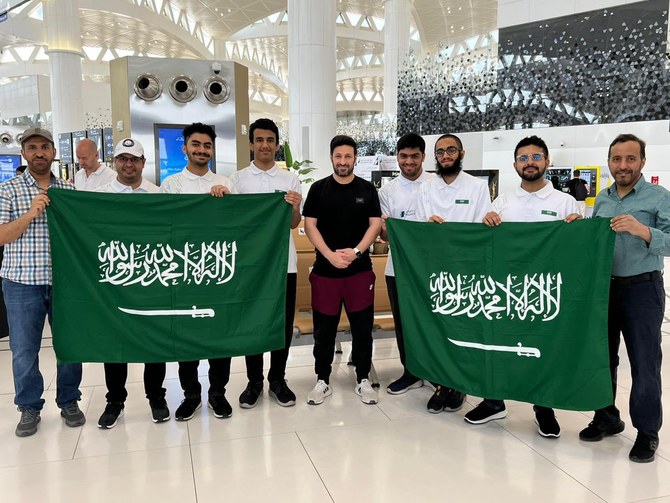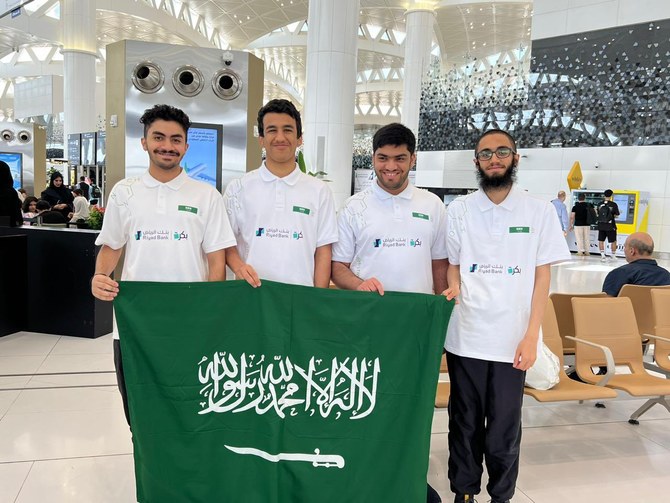JEDDAH: A Saudi team is participating in the International Chemistry Olympiad, which is being held in Switzerland from July 16-25.
The team is participating with the support of the Saudi Education Ministry and the King Abdulaziz and His Companions Foundation for Giftedness and Creativity, known as Mawhiba.
On Sunday, the team embarked on its journey with the aim of achieving success and recognition while representing the Kingdom on a global platform.
Saudi Arabia has accumulated a commendable track record in previous editions of the Olympiad, securing 10 silver medals, 25 bronze medals and two certificates of appreciation.
This year, the Saudi team’s participation is also intended to familiarize members with the organizational aspects of the event in preparation for hosting it next year.
Following the Olympiad’s conclusion, the Kingdom will receive the flag symbolizing its role as host of the 56th edition, scheduled to take place in Riyadh from July 22 to Aug. 1, 2024.
Badr Al-Majrathi, manager of the Competitions Department at Mawhiba, said the Saudi team went through a rigorous journey of training and qualification through forums and camps.
These activities were conducted under the guidance of a team of Saudi and international coaches, with the aim of competing for top positions and securing prizes at the competition. A recent training camp took place in Budapest, Hungary.
The Olympiad is an annual competition for high school students that occurs at the end of the academic year and spans 10 days.
It consists of two exams — one theoretical and one practical — each lasting five hours. The host country is responsible for organizing and preparing the questions.
Each participating country forms a team of up to four students, with participants being under the age of 20 and not yet enrolled in university.
The Olympiad’s primary goals are to foster communication and collaboration among students, and facilitate the exchange of educational and scientific experiences between nations.
The concept originated in Czechoslovakia in 1968, when chemistry Olympiads were integrated into the secondary education system across Soviet bloc countries. Initially, only countries from the bloc were invited to participate.
Saudi students compete in prestigious chemistry Olympiad
https://arab.news/493gu
Saudi students compete in prestigious chemistry Olympiad

- The team is participating with the support of the Saudi Education Ministry and Mawhiba
Saudi king, crown prince congratulate Montenegro and Kiribati on their special days

JEDDAH: Saudi Arabia's king and crown prince on Sunday congratulated President Jakov Milatović of Montenegro on his country's National Day celebration.
In a cable, King Salman wished Milatović "continued good health and happiness, and the government and people of Montenegro steady progress and prosperity," the Saudi Press Agency (SPA) reported.
Crown Prince Mohammed bin Salman, who is also the Kingdom's prime minister, sent a similar message in a separate cable, according to SPA.
Earlier on Saturday, the king and crown prince greeted Kiribati President Taneti Maamau on his country's Independence Day, wishing him and his constituents steady progress and prosperity.
Montenegro, located in southeast Europe, became part of Yugoslavia in 1918 during the realignment of nations after World War I. After Yugoslavia broke up in 1992, Montenegro formed a federation with Serbia, but opted later to become an independent republic in 2006.
Kiribati, an island republic in the central Pacific, gained its independence from the United Kingdom in 1979.
Both Montenegro and Kiribati are members of the United Nations.
Saudi artist rolls forward with bamboo paper

- Jumanah Telity’s eco-conscious art form is as durable as it is creative
JEDDAH: Saudi artist Jumanah Telity has found an unusual medium for her creativity: bamboo paper.
Through a labor-intensive process she transforms it into sturdy objects, from baskets and storage boxes to small-scale furniture and figurines.
“This art, like any other art, requires specific techniques, sense, and artistic thought to produce creativity,” she told Arab News. “It differs from other arts in that it is a very strong and practical product that is used daily and also decoratively.”

Originally an educator, Telity spent 19 years in schools, eventually serving as a principal.
In 2020, during the COVID-19 pandemic, she decided to explore her long-time fascination with natural materials such as wood, bamboo, and rattan.
That is when she discovered bamboo paper weaving online and something clicked.
HIGHLIGHTS
• In 2020, Saudi artist Jumanah Telity decided to explore her long-time fascination with natural materials such as wood, bamboo, and rattan.
• She recently displayed her work at Balad Al-Fann in Jeddah’s historic district.
“It strangely attracted me. I felt like I found my passion here because it really appealed to me,” she said.
Telity says the method involves tightly rolling paper into sticks using a special needle. It is then woven into shape.

“It begins with choosing the type of paper, its size, and the way it is cut,” she said. “After trying this art, you’ll be amazed at the strength of these products and how they can be washed with soap and water without being affected.”
She describes the art as eco-conscious because of the recycling involved in the process.
To hone her craft, Telity enrolled in intensive online courses specializing in the technique.

“I found what I was looking for,” she said. “The study was online, intensive, daily, and very precise in how to teach and train step by step.”
Now among the first Saudi artists to specialize in this form of bamboo art, she credits the Kingdom’s growing cultural landscape for supporting artists exploring niche and rare forms of expression.
“This type of art is considered one of the rarest arts in the world,” she added. “It requires precise skills and a deep understanding of transforming paper into a wood-like material.”
Telity recently displayed her work at Balad Al-Fann in Jeddah’s historic district. She was struck by how strongly the art resonated with visitors. “I noticed people’s amazement and admiration for this art and how they were attracted by the type of art, method of weaving and the strength and ability to withstand external factors,” she said.
She now plans to hold workshops to pass on her skills, with the goal of eventually becoming a certified trainer.
With growing interest from aspiring crafters and a renewed push for cultural innovation across Saudi Arabia, Telity believes the future of this art form is bright.
Once a symbol of Najdi homes, Al-Roshen fades from view

- Today, Saudis continue to express hospitality in new ways — hosting events in gardens, villas, or special venues, while maintaining the warmth and generosity that have always defined social gatherings
RIYADH: As Saudi Arabia rapidly modernizes, some elements of its traditional architecture are becoming rarer, but not forgotten.
Once a hallmark of Najdi homes, Al-Roshen remains a cherished symbol of Saudi hospitality and social values, even as lifestyles and housing designs evolve.
“Al-Roshen is a room for special guests,” said Mohammad Alhouti, a resident of Riyadh’s Aldeerah neighborhood.

“As soon as a person enters the house through the door, there is a ground-floor sitting room and a staircase. This staircase leads to Al-Roshen, separate so that the guest can go up as soon as they enter the house.”
Unlike the more common majlis, Al-Roshen offered a secluded space for important visitors.
According to Abdulrahman Alhouti, some people would add plaster to the walls of Al-Roshen, creating shapes and decorations that would make it stand out from the main majlis in the house.
FASTFACTS
• Once a hallmark of Najdi homes, Al-Roshen remains a cherished symbol of Saudi hospitality and social values, even as lifestyles and housing designs evolve.
• Unlike the more common majlis, Al-Roshen offered a secluded space for important visitors.
Though most contemporary homes are no longer built with an Al-Roshen, the spirit behind it remains.
Mohammad and Abdulrahman are a part of Thuluthiyyat Almasmak, a weekly cultural gathering held in front of Riyadh’s Al-Masmak Palace.

Their group includes Fahad Alhidyyan, helping document and share Riyadh’s history through stories of its neighborhoods, streets, schools and everyday life.
Their weekly gathering has reached its seventh year and the group has welcomed all types of visitors, from locals to international tourists coming to Riyadh, to discuss the past and present of the Kingdom’s capital.
“(The gathering) tells the story of the history of Riyadh, its old alleys, streets, schools, farms and everything old, from the time of King Abdulaziz until the beginning of the development,” Abdulrahman said.

Today, Saudis continue to express hospitality in new ways — hosting events in gardens, villas, or special venues, while maintaining the warmth and generosity that have always defined social gatherings.
“In the past, receiving guests was of great importance. The host would take great care in welcoming his guests, making every effort to provide them with the best he could,” Alhidyyan said.
“People now meet during Eid, weddings, or planned gatherings, though often outside the home. There is a difference, but the intention remains.”
Rather than fading away entirely, Al-Roshen now lives on through cultural forums and conversations that highlight the evolution of tradition in a rapidly changing society.
For those preserving these stories, the goal is not to resist change but to carry forward the values and meaning behind these cultural symbols.
Deputy minister receives Ukraine’s ambassador to Saudi Arabia

- Saudi Ambassador to Greece Ali Al-Yousef recently presented his credentials to the country’s president, Constantine Tassoulas
RIYADH: Abdulrahman Al-Rassi, the Saudi deputy minister for international multilateral affairs, received Anatolii Petrenko, Ukriane’s ambassador to the Kingdom, in Riyadh on Sunday.
During the meeting, the two sides discussed bilateral relations as well as prominent developments in regional and international arenas, the foreign ministry wrote in a post on X.
Meanwhile, Saudi Ambassador to Greece Ali Al-Yousef recently presented his credentials to the country’s president, Constantine Tassoulas.
Lebanon’s envoy wraps up tenure with visit to Arab News

- Kabbara acknowledged the long-standing relationship between Saudi Arabia and Lebanon and praised Arab News for promoting understanding between the two
RIYADH: Lebanon’s ambassador to Saudi Arabia, Dr. Fawzi Kabbara, on Sunday ended his tenure with a visit to Arab News Editor-in-Chief Faisal J. Abbas at the newspaper’s Riyadh headquarters.
During the meeting, Kabbara acknowledged the long-standing relationship between Saudi Arabia and Lebanon and praised Arab News for promoting understanding between the two with its “insightful reporting.”
“It is an honor to celebrate the enduring ties between Lebanon and Saudi Arabia during a time of significant change in the Kingdom under the leadership of King Salman and Crown Prince Mohammed bin Salman,” he said.
He highlighted the publication’s commitment to journalistic integrity and said it enriched the media landscape and supported diplomatic relations by keeping diplomats informed on local and regional news.

Kabbara also emphasized the pivotal role the media played in shaping public opinion and fostering cross-cultural dialogue.
During his tour of the newspaper’s headquarters, the envoy viewed editions dating back to its founding in 1975, including its first Christmas cover, the transformation under Abbas’ leadership in 2016 and award-winning editorial cartoons capturing key moments in world history.
Looking ahead, Kabbara said this was not the end of his time in the Kingdom. He expressed his eagerness to return “wearing a different hat” so he could witness the growth of Lebanon-Saudi relations and Arab News’ evolving role.
He concluded by expressing sincere gratitude to Arab News and Abbas. For his part, Abbas thanked the ambassador for his visit and wished him success in his future endeavors.























